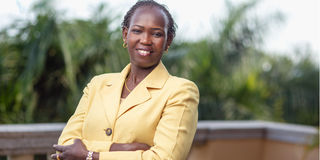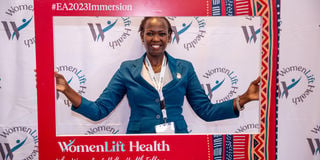Meet South Sudan's first female gynaecologist, Dr Idyoro Ojukwu

Dr Idyoro Ojukwu, the first female Obstetrician and Gynaecologist from South Sudan. She is a resident obstetrician and gynaecologist at the Mater Misercordiae Hospital in Nairobi.
What you need to know:
- Dr Idyoro Ojukwu grew up in a war-torn country at the height of Sudan civil wars.
- Even in the midst of the civil war, she emerged as the best student in the Eastern Equatorial region when she sat her intermediate school exams.
- She was among the first South Sudanese women to study medicine at the University of Juba.
Almost 40 years after the top university in South Sudan was founded, Dr Idyoro Ojukwu became the first woman Obstetrician and Gynaecologist (OBGYN) in the country.
That she was the first was a surprise to both Dr Idyoro and her family. After all, it was 2013 and she assumed by that time, there would have been other South Sudanese women who would have gone before her.
“I actually felt bad, but I have come to learn that it was because South Sudanese women have been marginalised for long. Yes, I'm proud and happy that I am the first one, but I don’t believe that should be the case,’’ Dr Idyoro says in an exclusive interview with Nation. Africa.
She shares details of growing up in a war-torn country at the height of Sudan civil wars, moving from home to pursue her studies, and being a woman of firsts in her country.
"I was born and raised in Juba, South Sudan in the 1980s. I was in primary school when the war started. There was a lot of shelling as rebels were targeting military camps. At some point, we had to build trenches in our home so that when the shelling began, we could all hide inside the trenches to protect ourselves,’’
“I remember there were times when there was hunger in Juba because the rebels had closed all roads that suppliers used to bring food into the city. It was difficult place and time to be a child,’’ she explains.
Polygamous family
Even in the midst of the civil war, Dr Idyoro emerged as the best student in the Eastern Equatorial region when she sat her intermediate school exams. Due to her excellent performance, her family decided to send her to relatives in Khartoum, the capital city of today’s Republic of the Sudan, to study.
“At 15 years, I moved to Khartoum because North Sudan was less affected by the war compared to Juba. Being the eldest child of a polygamous family, my father really wanted me to be successful so that I could take care of my younger siblings.’’
Dr Idyoro’s environment did not necessarily inspire her to study medicine. She did not have any relatives who worked in the field, nor did she interact with any female doctors. However, she was particularly brilliant and her family would affectionately refer to her as the ‘scientist’ of the family.
It, therefore, goes without saying that after completing her high school education, she enrolled at the University of Juba to pursue a Bachelor’s of Medicine and Surgery.

Dr Idyoro during a past conference in a Nairobi hotel. She is passionate about women's and girls' empowerment and runs a forum that encourages South Sudanese women to venture into medicine.
She also adds that she was among the first South Sudanese women to study medicine at the university. There were only three South Sudanese women in her class.
“In fact, the first group of South Sudanese women to be admitted to study medicine at the university were three ladies who joined a year ahead of us. This was in a class of about 70 to 80 students. Most of the female medical students were Arabs from North Sudan. It was extraordinary to be a South Sudanese woman studying medicine at the time,’’ she says.
Soon after completing her studies, she went back to her hometown, which had been ravaged by war, to provide medical services.
“This was in 2005 when the peace agreement between South Sudan and Khartoum had been signed. The agreement restored peace for a while, and the rebels opened the roads they had blocked. That was how I was able to get to Torit, Eastern Equatorial to serve my community.’’
Local clinic
Eastern Equatorial was, however, far from ready to host any medical doctors. The war had been particularly cruel to the healthcare sector in the region.
“A lot of people came back to the country after the peace agreement, so we were short staffed. I was the only female doctor amongst the four doctors who were posted to the local clinic. We did not even have a theatre, just an old table that we would use for surgeries,’’ Dr Idyoro explains.
After a year of working in Eastern Equatorial, she saw a gap in HIV treatment, care and prevention. At just 28 years, she was appointed the HIV and Aids Director for the region.
“I decided to set up the first VCT centre in the area. This encouraged more people who had fled as refugees to Uganda, to come back home since they could access medication and treatment at the clinic. I also established a VCT outreach clinic at the military base in Torit where army officers could access treatment,’’ she says.
The army officers were astonished that she was a doctor, yet she was so young. “They would always ask, ‘What is this little girl telling us?’, but with time, I gained their trust and was able to provide HIV treatment,” she says.
Dr Idyoro, l however, says she was not surprised by their reactions because South Sudan is a very patriarchal society.
“Boys and men are seen as the pillars of communities .If a woman just gives birth to girl, they are not considered ‘wife enough’. People also see boys as the only ones supposed to go to school, whereas girls should get married. This is why early marriages are common in South Sudan.’’
In fact, when Dr Idyoro was getting married in her mid-20s, many people in her community thought she had waited too long.
“People were asking, ‘Why are you still at home? Are you even going to give birth? You don’t even have a man to marry you.’ I was always discriminated against but I knew my worth and didn't let their sentiments get to me,’’ she says.
She got married in her hometown to show girls that one could still get married in their 20s.
Cervical cancer
“Most girls changed their views about education. They realised it was possible to get someone to marry you even when you are educated. They also learned that you don't have to just marry the people around you,’’ the medic says.
Two years after being deployed at Eastern Equatorial, she was awarded a scholarship to study obstetrics and gynaecology at the University of Nairobi. It was after she graduated in 2013 that she learned she was the first female OBGYN from South Sudan through congratulatory messages on Facebook.
Her ambition to improve healthcare in South Sudan did not stop there. Looking at the gap in cancer care in her country, she decided to enrol in a gynaecological oncology program at the University of Nairobi. Again, she became the first gynaecological oncologist from South Sudan.
“While I was practicing in South Sudan, we got a lot of women with limited finances suffering from cervical cancer. We had to refer them to Kenya because there aren’t many gynaecologist oncologists in the country. I decided to become one to help those women in South Sudan,’’ she explains.
Today, Dr Idyoro works as a resident obstetrician and gynaecologist at the Mater Misercordiae Hospital in Nairobi, Kenya.
“Some of my colleagues and I have established the South Sudanese Women in Medicine (SSwim) forum, which we use to mentor and encourage other South Sudanese women to venture into medicine,’’ she concludes.





